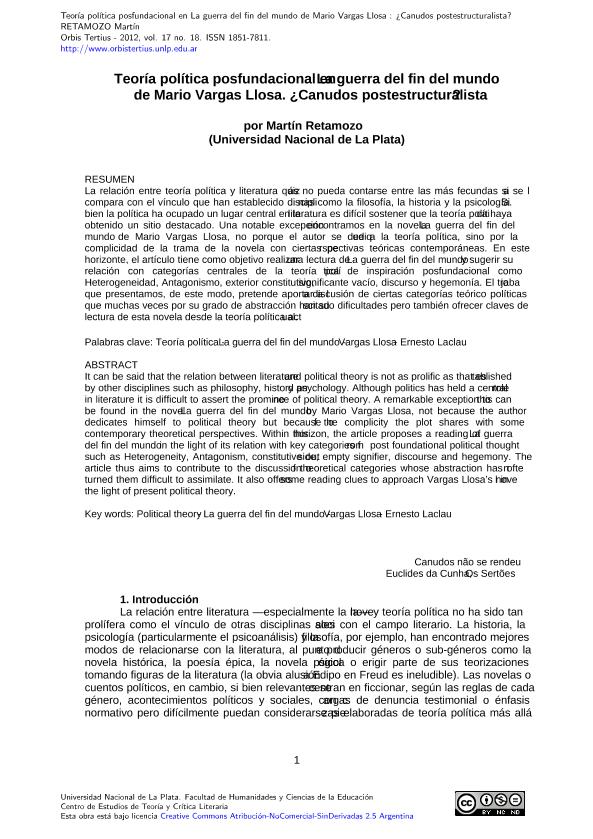Mostrar el registro sencillo del ítem
dc.contributor.author
Retamozo, Martin

dc.date.available
2019-08-29T16:26:01Z
dc.date.issued
2012-06-02
dc.identifier.citation
Retamozo, Martin; Teoría política posfundacional en La guerra del fin del mundo de Mario Vargas Llosa. ¿Canudos postestructuralista?; Universidad Nacional de La Plata. Facultad de Humanidades y Ciencias de la Educación. Centro de Teoría y Crítica Literaria; Orbis Tertius; 17; 18; 2-6-2012; 1-16
dc.identifier.issn
0328-8188
dc.identifier.uri
http://hdl.handle.net/11336/82491
dc.description.abstract
La relación entre teoría política y literatura quizás no pueda contarse entre las más fecundas si se la compara con el vínculo que han establecido disciplinas como la filosofía, la historia y la psicología. Si bien la política ha ocupado un lugar central en la literatura es difícil sostener que la teoría política haya obtenido un sitio destacado. Una notable excepción encontramos en la novela La guerra del fin del mundo de Mario Vargas Llosa, no porque el autor se dedique a la teoría política, sino por la complicidad de la trama de la novela con ciertas perspectivas teóricas contemporáneas. En este horizonte, el artículo tiene como objetivo realizar una lectura de La guerra del fin del mundo y sugerir su relación con categorías centrales de la teoría política de inspiración posfundacional como Heterogeneidad, Antagonismo, exterior constitutivo, significante vacío, discurso y hegemonía. El trabajo que presentamos, de este modo, pretende aportar a la discusión de ciertas categorías teórico políticas que muchas veces por su grado de abstracción han suscitado dificultades pero también ofrecer claves de lectura de esta novela desde la teoría política actual.
dc.description.abstract
It can be said that the relation between literature and political theory is not as prolific as that established by other disciplines such as philosophy, history and psychology. Although politics has held a central role in literature it is difficult to assert the prominence of political theory. A remarkable exception to this can be found in the novel La guerra del fin del mundo by Mario Vargas Llosa, not because the author dedicates himself to political theory but because of the complicity the plot shares with some contemporary theoretical perspectives. Within this horizon, the article proposes a reading of La guerra del fin del mundo in the light of its relation with key categories from post foundational political thought such as Heterogeneity, Antagonism, constitutive outside, empty signifier, discourse and hegemony. The article thus aims to contribute to the discussion of theoretical categories whose abstraction has often turned them difficult to assimilate. It also offers some reading clues to approach Vargas Llosa’s novel in the light of present political theory.
dc.format
application/pdf
dc.language.iso
spa
dc.publisher
Universidad Nacional de La Plata. Facultad de Humanidades y Ciencias de la Educación. Centro de Teoría y Crítica Literaria
dc.rights
info:eu-repo/semantics/openAccess
dc.rights.uri
https://creativecommons.org/licenses/by-nc-sa/2.5/ar/
dc.subject
Teoría Política
dc.subject
La Guerra del Fin del Mundo
dc.subject
Vargas Llosa
dc.subject
Ernesto Laclau
dc.subject.classification
Ciencias Sociales Interdisciplinarias

dc.subject.classification
Otras Ciencias Sociales

dc.subject.classification
CIENCIAS SOCIALES

dc.title
Teoría política posfundacional en La guerra del fin del mundo de Mario Vargas Llosa. ¿Canudos postestructuralista?
dc.type
info:eu-repo/semantics/article
dc.type
info:ar-repo/semantics/artículo
dc.type
info:eu-repo/semantics/publishedVersion
dc.date.updated
2019-04-26T18:19:08Z
dc.identifier.eissn
1851-7811
dc.journal.volume
17
dc.journal.number
18
dc.journal.pagination
1-16
dc.journal.pais
Argentina

dc.journal.ciudad
La Plata
dc.description.fil
Fil: Retamozo, Martin. Universidad Nacional de La Plata; Argentina. Consejo Nacional de Investigaciones Científicas y Técnicas; Argentina
dc.journal.title
Orbis Tertius
dc.relation.alternativeid
info:eu-repo/semantics/altIdentifier/url/https://www.orbistertius.unlp.edu.ar/article/view/OTv17n18a01
Archivos asociados
